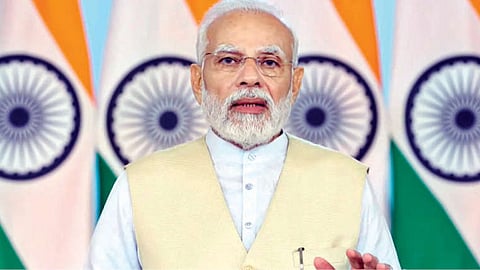

KEVADIA (GUJARAT): Prime Minister Narendra Modi on Saturday said delay in getting justice is one of the major challenges faced by the people of the country, and added that a sensitive judicial system is essential for a capable nation and a harmonious society.
Since obscurity of law creates complexity, new laws should be written in lucid manner and in regional languages to bring in “ease of justice” so that even the poor can easily understand them, he said, noting that legal language should not become a hurdle for citizens. In his video message aired at the inaugural session of the two-day ‘All India Conference of Law Ministers and Law Secretaries’ at Ekta Nagar in Kevadia near the ‘Statue of Unity’ in Gujarat, Modi also said that in the last eight years, his government has scrapped more than 1,500 old, obsolete and irrelevant laws, many of which continued from the time of British rule.
“Delay in getting justice is one of the major challenges being faced by the people of our country,” Modi said. “But our judiciary is seriously working towards resolving this issue. In this ‘amrit kaal’, we will have to work together to tackle this,” he said. Systems like alternative dispute resolution and Lok Adalats have helped reduce the burden on courts and the poor get justice easily, the PM added. Stressing the use of regional languages in the legal system, he said that they have to play a big role for the “ease of justice”. “Obscurity of law creates complexity. If law is comprehensible to the common man, it will have a different impact,” Modi said.
In some countries, when a law is framed, it is decided in two ways. One is by giving a detailed explanation of its legal terms using technical terminology, and another is by writing it in the regional language so that the common man can understand it, he added. “Therefore, while framing a law, our focus should be such that even the poor could understand the new law,” he said.
Some countries have the provision of deciding during the framing of a law as to how long it will remain effective, Modi pointed out. “So in a way, the age and the expiry date of a law is determined when it is being framed. When that (stipulated) date comes, the same law is reviewed in new circumstances. In India, too, we will have to go ahead with the same spirit,” he said.
He said he has been raising the issue of the use of local languages in the legal system before the judiciary.
Visit news.dtnext.in to explore our interactive epaper!
Download the DT Next app for more exciting features!
Click here for iOS
Click here for Android